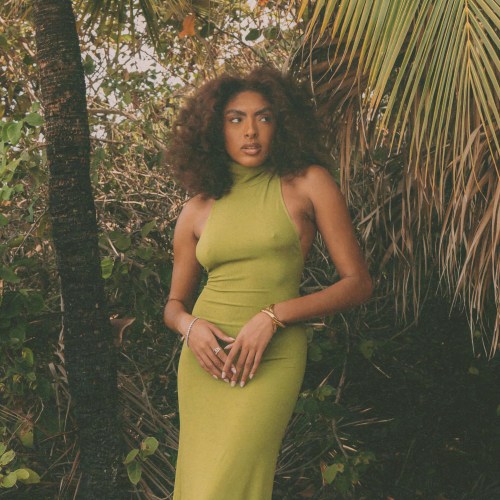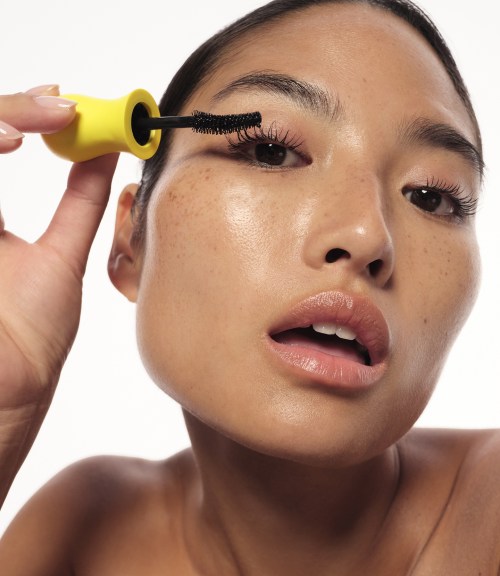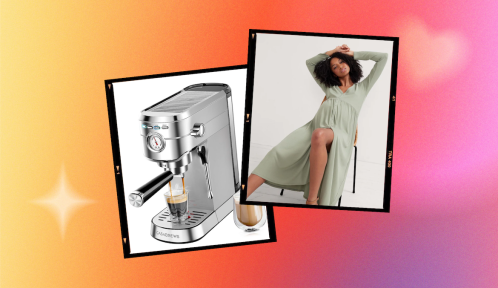If there’s one thing Ivy Coco Maurice knows, it’s how to move—with purpose, with style, and always with her community in mind. As the founder of WalkGood LA, Maurice has turned movement into a form of resistance, healing, and connection. What began in the summer of 2020 as a way to bring people together in the wake of the Black Lives Matter protests and the COVID-19 pandemic has since grown into a community-driven wellness movement. Through yoga, running, meditation, and art, WalkGood LA creates space for underrepresented communities to breathe, heal, and rebuild—together.
Raised in a home where activism, culture, and self-expression were at the forefront of her family values, Maurice carries with her the legacy of two powerful women: her grandmother, Jamaican designer Ivy Ralph, who instilled in her an appreciation for heritage and fashion; and her mother, the legendary actress Sheryl Lee Ralph, who taught her the power of self-love and service. But Maurice isn’t just walking in their footsteps; she’s forging her own path.
Under her leadership, WalkGood LA has evolved from a small gathering into a full-scale wellness hub, offering healing circles, creative workshops, and community-driven programming. As one of Well+Good’s 2025 Changemakers, Maurice sat down with us to talk about turning pain into purpose, building a movement, and the importance of honoring her own well-being along the way.
Well+Good: WalkGood LA is more than an organization; it’s a movement. What was the moment that made you say, “I need to create this”?
Ivy Coco Maurice: We started the organization in 2020 during the racial uprisings that coincided with the pandemic. WalkGood LA’s president—my brother, Etienne Maurice—was very moved by the deaths of Ahmaud Arbery, Breonna Taylor, and George Floyd; and we were all saying “We can’t breathe” during the Black Lives Matter movement. That was the moment we realized we also needed to find other ways to take care of our well-being.
So we took a deep breath and went to the streets. We started off with hosting a running protest against police brutality and went back to marching in the streets for 10 weeks. But eventually, we needed to figure out another way to really calm our spirits. How do we come together as a community and collectively heal?
One thing that my brother always reaffirmed to me is that we come into this life with our breath and we leave with our breath. So how do we utilize it on our journey here? My amazing cousin, Marley Rae Ralph, first led a protest through stretching—she’s not only a yoga instructor but also the director of health and wellness at WalkGood LA and the manager at our creative wellness studio, The WalkGood Yard. A week later, we started doing yoga in the park. What started off as just 25 people deep breathing together in the park has now become more than 300. Three years later, we were given a community grant by Propel Water and Michael B. Jordan to create our own creative wellness studio, which has helped us find so many unique ways to foster healing as a community.
Today, the studio has grown to be a space that's allowed our community members to come and practice showing up for themselves every day. Because before we can show up for other people, we have to show up for ourselves. We created space to take care of ourselves during a difficult moment in time, and that momentum eventually became a movement.
And our movement is called WalkGood LA for a reason. For the people who don't know, "walk good" is actually a Jamaican euphemism, and we are proud Jamaican-Americans. "Walk good" is a saying that you tell somebody if they're about to leave for a destination; it just means safe travels. And it's the same message we tell our community in LA: Make sure you walk with a good stride, stay protected, and spread good vibes.
How does WalkGood LA exist within the community today?
WalkGood LA is truly thriving. We’ve now expanded into so many different and fun kinds of activations—there’s RunGood, our run club; HikeGood, our hiking group; LaughGood, our comedy show; and FilmGood, our film festival. We also host creative workshops, sound baths, and meditation sessions, creating spaces for both movement and mindfulness.
Another thing we take pride in is our healing circles for Black men and women, known as YouGood? and YouGood Gyal?, respectively. A lot of the people who support WalkGood LA are women—we know that women of color are always going to show up. But YouGood? was specifically created to destigmatize the stereotypes of Black men.
You're seeing men cry in these healing circles, hoping that they leave with some sense of peace and release. It's beautiful to see Black men connect and check in on each other. Usually, you see men putting on a facade, carrying so much armor because they don’t want to burden anyone else. But being a Black man in America is already hard enough—why carry that weight around your own brothers? And I think that's the best part about the men's healing circle: They're not just breaking down; they're breaking through.
Wellness spaces aren’t always accessible to everyone. How has WalkGood LA worked to make healing more inclusive?
Our mission was to always create affordable healing in a way that let everyone feel seen and understood. Let's be honest: We've learned that healing is expensive, and not everybody can afford access to a yoga studio or a meditation retreat. What's special about WalkGood LA is that we were able to offer workshops to our community members at an affordable price. One day in the future, we'd love to be in a position where we can offer programming for free because we know that giving people access and equity to these programs is essential for wellness.
So much of our dedication to inclusivity and collective healing comes from the teachings of my mother, Sheryl Lee Ralph. One of the coolest things about growing up with her is that she was the mom who was always singing throughout the house, burning incense, and repeating affirmations all day long. I grew up in a very affirming household, and I always knew that I was loved. The individual I’ve grown into today is truly rooted in the laughter, joy, and abundance that she instilled within me. They made me feel like anything I put my mind to was possible.
Certain affirmations that [my mom] gave me still live with me to this very day, like "Life is all about choices,”—which is now something I have tattooed on my back. I repeat it to myself daily, and it reminds me to choose myself and remember that I am loved, valued, and appreciated.
Because those are the things I was told at a young age, I believe them so deeply, and I'm able to share that same message with everyone within my wellness practice at WalkGood LA and hopefully empower them, too.
In the wake of the LA wildfires, how have you helped foster healing for those affected by the fires?
I always say there is no community without unity, but there's also no unity without community. Those two things always go hand in hand. We started our organization during a very tumultuous time and we were able to rise from the ashes and grow a garden through cement. That's exactly what we hope to do for the community right now in the aftermath of the fires.
The LA wildfires almost felt like a flashback to what COVID was like for us. It was another moment where we realized we had to act fast, we couldn't wait, and we knew there were people in need—specifically, Black and brown people who looked just like us, like those affected by the Eaton Fire in Altadena, a historically Black city. This is a city that's revolutionized Black people, Black businesses, and Black excellence—a city that, in the ‘50s and ‘60s, wasn’t expected to thrive. But Black people took it from nothing and turned it into something. I don't want that history to be forgotten. That’s why we're trying to raise as much money as we can and keep the conversation going, because the real work starts now.
We raised money, became a pickup and donation center, and used our social media to educate people about what was actually going on with the fires. We also called in physical therapists and chiropractors to treat firefighters, because it wasn’t just about helping displaced families, but also those on the frontlines. We even collaborated with AFROPUNK to tap into a larger community of members with their own platforms. We’re more powerful when we work as one, and when we put our heads together, that’s when we create real change.
But beyond donations, I wanted to be very hands-on with the families who were affected by the fires. I talked to so many people and realized that, more often than not, what they needed most was just to be heard. So we created that space—one where people could feel understood and hopeful, in addition to receiving essentials like food, clothes, and water. It was important for us to just show up and be there for those who needed us. We wanted to embody what it means to be from LA—the city of angels.
I’ve since stayed connected with so many of the people I met during the fires, and those relationships have been a big source of hope for me. Recently, we had the opportunity to bring some of them—volunteers, first responders, and families who lost their homes—to the Grammys. It was a moment of joy in the middle of so much hardship. And as a stylist, outside of my work with WalkGood LA, I was able to help style some of the mothers and daughters I’d connected with, which made the experience even more special. It was so heartwarming to witness people who had just lost everything be able to celebrate a night of music, love, and empowerment in the city. Those glimmers can keep you going, even in times of pain.
Fashion is such a big part of your identity—how does it connect to your wellness journey and the work you do in the community?
Fashion and community go hand in hand for me. It's one of those things that's always allowed me to express myself, but it's also a big part of my Jamaican roots. My grandmother, Ivy Ralph, was a fashion designer and seamstress herself, which inspired the creation of our brand, The House of Ivy. I take a lot of where I come from and my ancestry and put it into fashion. It feels like I'm not just representing myself, but also my culture. There's culture that's woven into my fabrics and fashion.
But, fashion is also an important piece of my wellness practice. When I'm working with clients, the first thing I ask them is, "How do you want to feel?" And people are always a little surprised when I say that because it can be kind of a deep question. This is my way of reminding myself and others that fashion is a way you can show up for yourself and your well-being. I look at style as therapy, and I always want to make sure that people look good, but that they're also feeling good.
Wellness looks different for all of us. What mindset or practice has been most transformative in your own journey?
Wellness is patience, wellness is love, wellness is healing, and wellness is a journey. I always say wellness isn’t a destination—it’s a way of life. For me, it often starts with affirmation. That’s something my mom taught me, but it’s also something I’ve picked up from people in the community. Like, I love Rihanna—she has some great affirmations. I remember someone asked her once, "If you wake up one day and don't feel your best, what do you do?" And she said, "Just pretend you feel great."
When you start telling yourself that, you start believing it, and it eventually becomes action. So, even on those days when you don't feel well, reaffirm yourself anyway. You'll be surprised how much your mind can influence your well-being and help you heal from within.
This interview has been edited for length and clarity.
Sign Up for Our Daily Newsletter
Get all the latest in wellness, trends, food, fitness, beauty, and more delivered right to your inbox.
Got it, you've been added to our email list.











